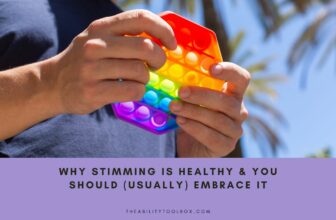
As a parent on the spectrum with ADHD, the challenges of parenting my autistic 14-year-old daughter have been some of the hardest yet most rewarding of my life. Star* is equally both difficult and awesome. She is compassionate and sweet one moment and angry and resentful the next. While I would say this is true of all children, with one of my daughters neurotypical, and two of my daughters on the spectrum, there has been a vast difference in the intensity of these feelings and the difficulties it presents to parents and children.
Star is my youngest and last child at home and has been such a brave warrior. She’s already survived more in her lifetime than most ever will. She’s living with a benign brain tumor, has had surgery to untether her spinal cord, and was diagnosed with the genetic condition Ehlers-Danlos syndrome. None of these things have slowed her down. When she was diagnosed with autism after years of being told she had a developmental disorder, I wasn’t surprised. In a way we were relieved. She said, “This means there are other people like me!” We’ve always seen it as a positive difference and she’s handled it with so much grace.
Parenting a neurodiverse child looks different than parenting a neurotypical one. There is a lack of social cues and executive functioning that often leads to a frustrated, anxious teen. Combine that with black-and-white thinking and being highly distracted, and it’s often a recipe for disaster. I’m speaking about both of us now! In addition to being on the spectrum, I’m also chronically ill from the same genetic condition she has and intracranial hypertension, an incurable brain disease. Every day is a struggle. I’ve had eight brain surgeries, and she’s had two, so our struggles in communication are legendary. We push and pull, we love each other and sometimes we don’t like each other. Despite this, at the end of the day, hugs are free and loving words are spoken.
Growing up I was often labeled weird and “gifted” and went undiagnosed for years. I didn’t have the appropriate tools and coming from a dysfunctional family I didn’t have a good example of parenting. It took me a long time to get it right with my children. I’m still trying to get it right, with my adult children and my teen. My disabilities have helped me understand their struggles better. My Star is a talkative, sparkly, and vibrant soul. She has been my anchor that keeps me grounded with a higher purpose. I have learned so many things through her unique perspectives on life. She’s one of my greatest heroes and has taught me many things on this journey.
As she’s grown older, the lessons have become more painful and brought on by brutal unrelenting honesty on her part. She’s often stubborn to the point of narrowing her focus to only her opinion, which will not be swayed. I spent a lot of time trying to talk her into doing things the way I thought they needed to be done. What I figured out painfully was if I could broaden my focus to look at her standpoint without my opinion, I could see it through her eyes. I think that realization saved our relationship.
Star wasn’t diagnosed until she was 8 because she was highly verbal, despite struggling with sensory processing disorder and an initial diagnosis of pervasive developmental disorder. We started early intervention in special needs preschool, and elementary school was a blur of IEP meetings, health plans, surgeries, bullying, and constant anxiety punctuated by calls from the school. This started to change in middle school, after the pandemic. She had been three grades behind most of her life, but during COVID, I was able to homeschool her. She caught up to grade level and excelled in virtual learning. She was able to keep this up when schools opened and they suggested moving her from a fully contained classroom into the general education population.
I initially fought hard against it, trying to advocate for and protect her. Star had been in special education classes her entire life and to be suddenly put into general education was a giant leap of faith. I had to let her spread her wings to see if she could fly on her own. It was the best thing I could’ve ever done for her. She excelled in that environment. Despite her challenges, she’s overcome all obstacles, making it onto the honor roll three years in a row and graduating from middle school with her peers.
Learning when to hold on and help, and when to let go with grace has been my biggest challenge. Letting go in a sometimes hostile world has been one of the hardest things. Her neurodiversity makes her unique and wonderful but also presents difficulties in a world that caters to the neurotypical. I know all too well the dangers she might face while navigating that.
I believe any parent goes through this to some degree, but for a parent of an autistic teen, I think it’s especially difficult because they’re more vulnerable. We feel the need to hang on but we know we need to let go. As my child grows up, the hardest thing has been learning when to stand back and let her have her independence. When not to hover like the helicopter Mom I’ve had to be most of her life. She didn’t need me to protect her so fiercely anymore because she was standing up for herself.
She recently ripped off the band-aid by kicking me out of her primary doctor’s appointments. For a child with a brain tumor, a genetic disorder, and autism, stepping aside was hard. After all the therapies, appointments, and time invested, I’m supposed to just step back. I finally realized that’s the whole point behind parenting. Doing your best to help them until they’re ready to do things on their own. It’s about her having autonomy and choices in her life. It’s easy to get lost in their basic everyday needs and forget their need for independence to grow.
She’s a complicated communicator and I’m a difficult comprehender, so we kept miscommunicating. She didn’t have the skills to tell me what she needed so she allowed it to fester until she resented me. Enough to kick me out moments before her well-child visit with her pediatrician. At the time, unreasonable as it may be, I felt betrayed. She both needs me and pushes me away. The doctor called during the appointment and between my crying, and my daughter yelling, we all agreed in the future I would come in with her at appointments at the beginning and end. Star would handle the exam part on her own, without me.
This came as such a shock because during every appointment Star has gone close to nonverbal, looking to me to answer all questions for her. When I thought about it, this was the best possible outcome. From her perspective, she finally had some control over what was happening, and her voice is being heard. I’ll still be able to tell the doctor my concerns and hear outcomes, and she’ll have privacy. I was relieved that finally, her doctor would be able to hear from her directly. Only she knows her symptoms and feelings. The problem was that her truth is often subjective. Even knowing this risk, it’s still the right thing for her. Painful as it may be, my little girl was growing up.
I’m learning so much from all of our compromises. I realize my own neurodiversity is responsible for so much I’ve been avoiding. Like she was avoiding the doctor’s questions, I often avoid things I need to do. It’s hard to find time with my busy, spinning, flapping, giggling whirlwind of a daughter. This makes it hard to get anything done but has often become my excuse to avoid important things. She’s teaching me not to be so hard on myself. To stop and smell the roses and be proud of my achievements. I look at her with wonderment with every action, every advancement, and every time she proves them wrong with her abilities and independence. I had to let go of all the things I wanted for her life and start listening to what she wanted instead of what I thought she needed. These two things aren’t always convergent.
I have learned to listen better, widen my perspective, and be more patient. Not to say I don’t still struggle with those things, because I do every day. The struggle is real, but so are the rewards. I get to see her grow into this fiercely independent, beautiful, smart, creative young woman and bask in the glow of taking a small part in creating and nurturing her. I cradled her spark in my hand so that when it was time I could hand it back to her, and instead of burning her it would light up the whole sky. That’s what loving my autistic teen has been like. My Star, my Firefly. She just needed me to believe in her without reservation.
That’s what all children need from their caregivers. They need to be protected and loved but to recognize when it’s time to let them grow. To rise above their challenges and join their peers in whatever makes them happy. We don’t withdraw the help and protection. We don’t put aside our advocacy. We can step aside as their coaches and instead take an active role as the lead cheerleader on their team. We can be available and involved but let them decide what they want their future to look like.
As a neurodiverse Mom, taking my trip to the sidelines has been exceedingly painful but the most beautiful journey. I have no regrets and I’m so honored to be by her side while she creates the colorful canvas that is her life. She has always been my favorite work of art.
*Star is a pseudonym and this story has been published with her consent.











